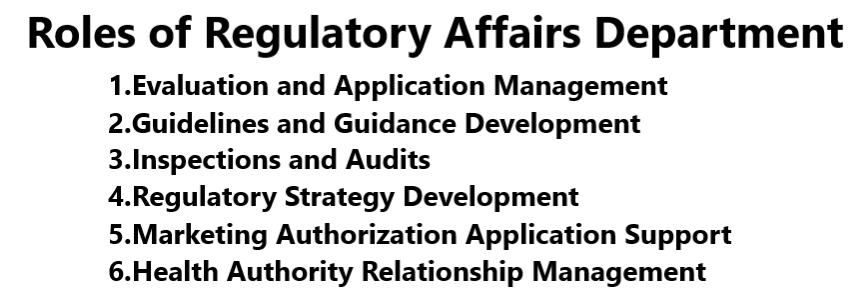Explore the key roles of Regulatory Affairs Department in Health Authorities and Pharmaceutical Industries. Discover their contributions to drug development, compliance, and global regulatory strategies.

Roles of Regulatory Affairs Department
Pharmaceutical Regulatory Affairs Departments have crucial role in the world of medicine. They help drug companies to follow rules and work with health agencies. This article explains what these departments do and why they’re important in drug development and following the law.
Roles of Regulatory Affairs department in Health Authorities (HA):
- Evaluation of MAA (Marketing Authorization Application):
- Evaluation of new drugs application, new biologics application, medical device and cosmetics application, generic application, clinical trial application, variation application, drug master files for API, excipients, and packaging materials and site master file for GMP inspection.
- Issue of evaluation comments/exigencies to manufacturers.
- Management of various applications and maintenance of annual update record.
- Approval of post-marketing management.
- Issue of MAA, GMP and GCP approval certificate.
- Management of MAA online and up-gradation to common technical document format.
- Input for Guidelines and Guidance Documents:
- Issue of guidelines and guidance documents for quality, safety, efficacy, pricing control and CTD for implementation.
- Collaboration with global and regional harmonization units to exchange technical information.
- Facilitating smooth management of pharmaceutical business in countries.
- Inspection:
- Audit of GMP at drug manufacturing site.
- Audit of GCP at clinical study site and bio-equivalence center.
- Issuance of certificates to confirm the approval status.
- Support to Pharmaceutical Manufacturers:
- Providing support to pharmaceutical manufacturers to define drug development pathway during pre-NDA meeting.
- Conducting timely meetings with the pharmaceutical manufacturers association to discuss ongoing challenges, technical issues, discussion and future development.
- Monitoring of Drug Safety and Efficacy:
- Collection of pharmacovigilance data and timely reviewing drugs in markets.
- Monitoring clinical trials and also approving the results.
- Performing fast track designation for drugs critical for the patient population.
Roles of Regulatory Affairs Advisors in Pharmaceutical Industries:
- Define Regulatory Strategy for Drug Development:
- Selection of drug products for a specific market.
- Participation in business development, marketing and project team meetings.
- Explanation of the type of application by consulting with the specified Health Authority (New Drug or Generic Application).
- Preparation of a Global Regulatory Plan (GRP) defining Chemistry, Manufacturing and Control (CMC), Clinical and Non-Clinical Requirements.
- Providing advice to the Research and Development (R&D) team for developing products.
- Marketing Authorization Application:
- Providing information about the submission type (NDA, NBA, CTA, etc.).
- Assisting in compiling the Type I-IV Drug Master Files (DMF), Site Master File (SMF), and other necessary documents for submission.
- Preparing the dossier in an acceptable national format or Common Technical Dossier (CTD) format for global submission.
- Providing technical evaluation and support to manufacturing location.
- Helping in drug submission, preparation of approval calendar, prediction of timeline required for approval of drug product.
- Managing the life cycle of drug product registration by timely submitting post-approval changes, annual updates and renewal submissions.
- Submitting pharmacovigilance data to the respective Health Authority for drugs already in the market.
- Health Authority Relationship:
- Participation in meetings of Health Authorities and giving advice
- Making suggestions and recommendations for drafting guidelines and circulars.
- Maintaining a good working relationship with the evaluators of Health Authority.
- Staying updated about the latest regulatory guidelines.
- Regulatory Systems and Processes:
- Maintaining records for drug product submission and approval database.
- Drafting Standard Operating Procedure (SOP) for smooth management of the drug regulatory affairs department.
- Providing internal training to staff to keep them updated about the regulatory environment.
- Exchanging regulatory knowledge by participating in regulatory forums/conferences/webinars/seminars.
- Keeping records of documents through Information Technology (IT).
- Maintaining software for online submission in Common Technical Dossier (CTD) format.
You may also like to read Drug regulatory authorities in pharmacy with list. Regulatory Affairs in Pharma.
Short Answer Questions with Answer
- SAQ: What is the primary responsibility of the Regulatory Affairs department in evaluating Marketing Authorization Applications (MAA)?
Answer: The primary responsibility is to evaluate various types of applications, including new drugs, biologics, medical devices, generics, clinical trials. - SAQ: How does the Regulatory Affairs department support pharmaceutical manufacturers?
Answer: They provide guidance on the drug development pathway, conduct pre-NDA meetings and assist in addressing technical issues and challenges. - SAQ: What role does the Regulatory Affairs department play in ensuring the safety of drugs in the market?
Answer: They collect pharmacovigilance data and review drugs in the market, monitoring their safety and efficacy. They may also designate fast track status for critical drugs. - SAQ: What is the purpose of issuing evaluation comments/exigencies to manufacturers? Answer: It serves to communicate necessary changes or requirements to manufacturers to meet regulatory standards and gain approval.
- SAQ: What does the Regulatory Affairs department do in Health Authority relationships?
Answer: They participate in Health Authority meetings, offer advice and make recommendations for guidelines. - SAQ: What types of audits does the Regulatory Affairs department conduct?
Answer: They audit Good Manufacturing Practices (GMP) at drug manufacturing sites and Good Clinical Practices (GCP) at clinical study sites and bio-equivalence centers. - SAQ: How does the Regulatory Affairs department assist in marketing authorization applications?
Answer: They provide information on submission types, help compile necessary documents, prepare dossiers for submission and predict timelines for drug approval. - SAQ: What is the purpose of maintaining records and SOPs in the Regulatory Affairs department?
Answer: Records are maintained for drug product submissions and approvals and SOPs are drafted to ensure the smooth management of the department.
You may also like to read Technology Transfer Agencies in India.
